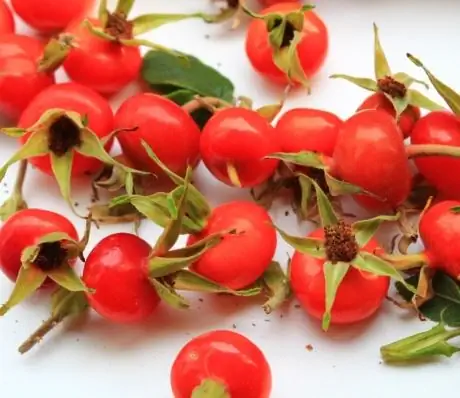- Author Rachel Wainwright wainwright@abchealthonline.com.
- Public 2023-12-15 07:39.
- Last modified 2025-11-02 20:14.
Peach
The peach tree is a plant belonging to the subgenus Almond, of the Pink family. The fruit of a peach tree is spherical, velvety to the touch, with a groove on one side. The peach bone is furrowed and wrinkled, with dotted dimples. The taste of the fruit is juicy, rich and aromatic.
The ratio of BJU in the product

Source: depositphotos.com How to burn 39 kcal?
| Walking | 10 min. |
| Jogging | 4 minutes |
| Swimming | 3 min. |
| A bike | 6 minutes |
| Aerobics | 8 minutes |
| Household chores | 13 minutes |
The origin of the peach is not known for certain. To date, the culture is successfully bred in Southern Europe, Asia and warm regions of America. Peach bears fruit best in the same climatic conditions as grapes.
There are two types of peaches: common peach (pubescent) and smooth (nectarine).
Benefits of peaches
Peach is the most valuable product in the human diet, considered a delicacy. The pulp of a ripe fruit has a pleasant velvety taste and aroma, due to the presence of acetic, formic, caprylic and valeric acid esters in the fruit - however, the properties of a peach are not limited to these alone: the fruits are recommended for use by children, people weakened after an illness, as well as patients, suffering from heartburn and a tendency to constipation.
Peach fruits are used both fresh and processed, for making jams, compotes, juices or dried fruits.
Peaches improve food digestion, enhancing the secretory activity of the gastrointestinal tract, have a preventive effect on kidney diseases, rheumatism, gout, gall bladder, liver, and cardiovascular system. The high potassium content in peach makes it possible to use this fruit successfully in case of heart rhythm disturbances.
The benefits of peach are obvious: ripe fruit contains 83% water, 15% sugar, malic, tartaric, citric, chloragenic, quinic acids, coloring, nitrogenous and aromatic substances, as well as vitamins (C, B, provitamin A) and trace elements (potassium, calcium, iron, phosphorus, zinc, copper, manganese).
There are enough P-active substances in the pulp, the content of which depends on the type of fruit - most of all vitamin P, which determines the antioxidant properties of peaches, is found in Armenian fruits.
The high magnesium content in peaches has a beneficial effect on the human psyche, alleviating the effect of stress on the nervous system. The presence of iron in the fruit of the peach tree helps prevent the occurrence of anemia.
Peach leaves and seeds also have medicinal properties. A decoction of peach leaves, for example, has a mild laxative effect, preventing flatulence in the intestines. In addition, this remedy relieves headaches, pain with inflammation of the bladder in men, and eliminates the symptoms of rheumatism.
Fresh peach leaves mixed with raw unpeeled potatoes can help get rid of carbuncles, abscesses, psoriasis, and shingles.
Peach seeds are especially valuable: they contain vitamin B17, known for its anti-cancer properties, and bitter almond oil.

Calorie content of peaches
The calorie content of peach is quite low - it is 45 kcal / 100 g of its edible part, which allows us to call this fruit dietary.
Contraindications
Due to the high sugar content, it is not recommended to eat fresh and especially dried peach fruits for people suffering from obesity or diabetes. Also, you should not abuse the fruit of the peach tree for allergy sufferers.
YouTube video related to the article:
Found a mistake in the text? Select it and press Ctrl + Enter.






